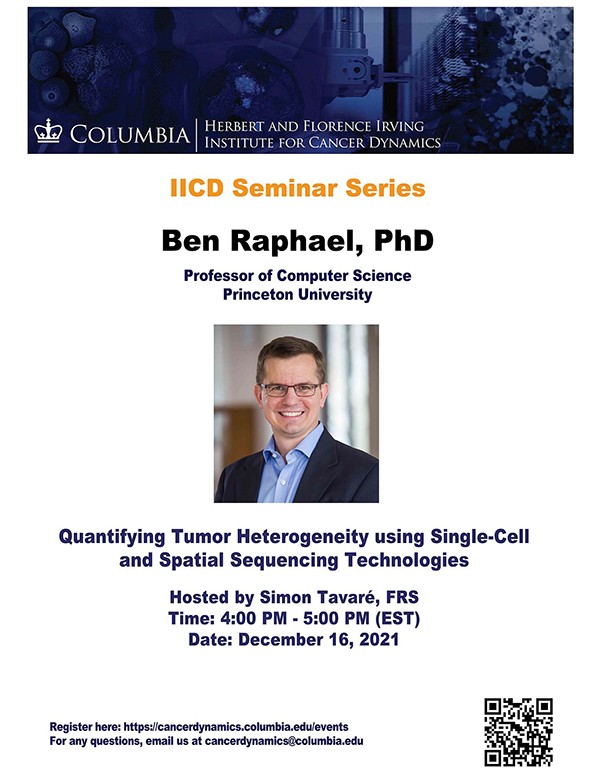The Herbert and Florence Irving Institute for Cancer Dynamics hosts a seminar series on the topic of mathematical sciences underpinning cancer research. The monthly seminars take place on the third Thursday of the month, 4:00-5:00 PM EST. The presentations are held via Zoom and are opened to the Columbia community and to researchers outside Columbia University.
On Thursday, November 18th (4:00-5:00 PM, EST), IICD welcomes Ben Raphael, PhD, Professor of Computer Science, Department of Computer Science, Princeton University.
To attend the seminar, please register here: https://columbiauniversity.zoom.us/meeting/register/tJAudOqqqTsiEtCKVr6cfJyjrN4V_St-9_WY
Title: "Quantifying Tumor Heterogeneity using Single-cell and Spatial Sequencing Technologies"
Abstract: Tumors are heterogeneous mixtures of normal and cancerous cells with distinct genetic and transcriptional profiles. In this talk, I will present computational approaches to quantify tumor heterogeneity and reconstruct tumor evolution using data from single-cell DNA and spatial RNA sequencing technologies. First, I will describe CHISEL, an algorithm to estimate allele-specific copy numbers from low-coverage whole-genome single-cell sequencing data. Using CHISEL, we reconstruct the evolution of a breast tumor from thousands of sequenced cells containing numerous copy number aberrations. Next, I will present two approaches to analyze the spatial organization of tumors and tissues using spatial transcriptomics, a technology that produces paired measurements of RNA expression and 2D spatial coordinates at thousands of locations from a tissue slice. One approach, STARCH, detects copy number aberrations in spatial transcriptomics data, while the second approach, PASTE, aligns and integrates spatial transcriptomics data across multiple adjacent tissue sections. I will demonstrate the advantages of modeling spatial correlations when analyzing spatial transcriptomics data from both normal and cancer tissues.
Biography: Ben Raphael is a Professor of Computer Science at Princeton University. His research focuses on the design of combinatorial and statistical algorithms for the interpretation of biological data. Recent areas of emphasis include cancer evolution, network/pathway analysis of germline and somatic mutations, single-cell and spatial DNA/RNA sequencing, and structural variation in human and cancer genomes. His group’s algorithms have been used in multiple projects from The Cancer Genome Atlas (TCGA) and the International Cancer Genome Consortium (ICGC). He received an S.B. in Mathematics from MIT, a Ph.D. in Mathematics from the University of California, San Diego (UCSD), completed postdoctoral training in Bioinformatics and Computer Science at UCSD, and was on the faculty of Brown University (2006-2016). He is a recipient of the 2021 Innovator Award from the International Society for Computational Biology, the Alfred P. Sloan Research Fellowship, the NSF CAREER award, and a Career Award at the Scientific Interface from the Burroughs Wellcome Fund. He is elected Fellow of the International Society for Computational Biology (2020).

